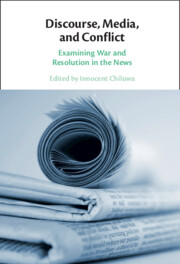Book contents
- Discourse, Media, and Conflict
- Discourse, Media, and Conflict
- Copyright page
- Contents
- Figures
- Tables
- About the Authors
- Foreword
- Introduction
- Part I Conflict Discourse in Newspaper Reporting
- Part II Electronic Media and Online Discourses of Conflict
- 5 Making a Case for War
- 6 “The Situation on the Korean Peninsula”
- 7 Against a Hard-Earned Peace
- 8 Ideological Exclusion
- 9 Violence for Social Change
- Part III Media Discourse and Conflict Resolution
- Index
- References
8 - Ideological Exclusion
Defining the (Dis)believer in Extremist Muslim Periodicals – Dabiq and Inspire
from Part II - Electronic Media and Online Discourses of Conflict
Published online by Cambridge University Press: 21 April 2022
- Discourse, Media, and Conflict
- Discourse, Media, and Conflict
- Copyright page
- Contents
- Figures
- Tables
- About the Authors
- Foreword
- Introduction
- Part I Conflict Discourse in Newspaper Reporting
- Part II Electronic Media and Online Discourses of Conflict
- 5 Making a Case for War
- 6 “The Situation on the Korean Peninsula”
- 7 Against a Hard-Earned Peace
- 8 Ideological Exclusion
- 9 Violence for Social Change
- Part III Media Discourse and Conflict Resolution
- Index
- References
Summary
No religious tradition or country seems to be unequivocally, inherently free from the threat of extremism. As a result of domestic and international acts of terrorism, much of the world seems occupied with the views and actions of Muslims, calling particular attention to the Salafi sect. Some groups belonging to this sect disseminate and promulgate their views through online periodicals, in order to solidify their ideological base and recruit new members. In particular, this chapter relates secular and non-secular characterizations of √KFR – the Arabic triliteral root referring to disbelievers and states of disbelief – to the characterization espoused in electronic periodicals from al-Qa’ida and Da’esh. Over one thousand tokens of derived lexemes of √KFR are extracted using AntConc from thirty issues, reduced to a taxonomy, and examined through the discursive strategies utilized.
- Type
- Chapter
- Information
- Discourse, Media, and ConflictExamining War and Resolution in the News, pp. 194 - 212Publisher: Cambridge University PressPrint publication year: 2022



